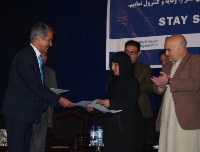 Deputy Minister of Public Health Dr Ahmad Jan Naeem presents a certificate to Angila who won a WHO art contest on diabetesKabul 10 April 2016 – The Ministry of Public Health and World Health Organization (WHO) celebrated annual World Health Day at an event held in Kabul today, highlighting a dramatic rise in diabetes cases and calling for efforts to step up prevention and treatment. Diabetes is a chronic disease characterized by elevated levels of blood sugar which leads over time to serious damage of the heart, blood vessels, eyes, kidneys and nerves.
Deputy Minister of Public Health Dr Ahmad Jan Naeem presents a certificate to Angila who won a WHO art contest on diabetesKabul 10 April 2016 – The Ministry of Public Health and World Health Organization (WHO) celebrated annual World Health Day at an event held in Kabul today, highlighting a dramatic rise in diabetes cases and calling for efforts to step up prevention and treatment. Diabetes is a chronic disease characterized by elevated levels of blood sugar which leads over time to serious damage of the heart, blood vessels, eyes, kidneys and nerves.
Around 9% of adults have diabetes and an estimated 1.5 million deaths are caused by the disease every year globally. WHO projects that diabetes will be the seventh leading cause of death by 2030. In Afghanistan, diabetes goes largely unnoticed and untreated. It is estimated that in Afghanistan 8.4% of the population, or around 2.7 million Afghans, suffer from diabetes.
“If diabetes is not controlled well, it can cause complications including heart attacks, strokes, kidney failure, blindness, and foot ulcers that can lead to amputations. Many of these complications and premature deaths could be prevented,” said H.E. Ferozuddin Feroz, Minister of Public Health. “We must step up the fight against diabetes and scale up prevention and treatment. The Ministry of Public Health is working on improving access to essential diagnostic services and diabetes medicines and increasing Afghans’ awareness about this disease.”
“The burden of diabetes is felt by individuals, families, communities and the health sector but much of this burden is avoidable. Many cases of diabetes can be prevented, and all can be detected and managed. Exercising regularly, eating healthily and avoiding smoking are key components in the fight against diabetes,” said Dr Richard Peeperkorn, WHO Representative in Afghanistan.“WHO continues to support the Ministry of Public Health in halting the rise of diabetes through scaling up prevention and strengthening the health system’s capacity to diagnose and treat people with diabetes.”
There are 2 types of diabetes – type 1 is a chronic condition in which the pancreas produces little or no insulin by itself. The most common is type 2 diabetes, usually in adults, which occurs when the body becomes resistant to insulin or does not make enough insulin. Type 2 diabetes is largely the result of excess body weight, physical inactivity and unhealthy dietary practices. Up to 70% of type 2 diabetes cases can be prevented or delayed by healthy lifestyles.
Early diagnosis of diabetes can be accomplished through blood testing which can be done at all health centres. Treatment of diabetes involves lowering blood glucose. Type 1 diabetes is managed with insulin as well as dietary changes and exercise. Type 2 diabetes may be managed with non-insulin medications, insulin, weight reduction or dietary changes.
For more information:
WHO
Sini Ramo
Communications Officer
This e-mail address is being protected from spambots. You need JavaScript enabled to view it
+93 78 220 0354
Ministry of Public Health
Dr Muhammad Ismail Kawusi
Spokesperson
This e-mail address is being protected from spambots. You need JavaScript enabled to view it
+93 79 288 8855



